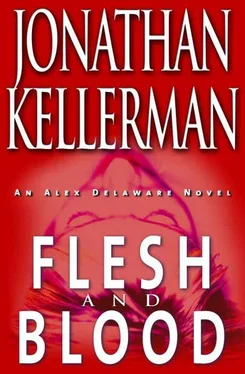“She’s out of prison?”
“Paroled half a year ago. Found herself a new line of work.”
“What’s that?”
“Similar to her old gig, but legal. Dressing the insecure.”
The boutique was on Robertson just south of Beverly, five doors north of a restaurant-of-the-moment where valets shuffled Ferraris and alfresco diners laughed too loudly as they sucked bottled water and smog.
Déjà View
Couture with a Past
Eight-foot-wide storefront, the window draped in black jersey and occupied by a single, bald, faceless, chromium mannequin in a billowing scarlet gown. A bell push was required for entry, but Milo’s bulk didn’t stop whoever was in charge from buzzing us in.
Inside, the shop’s mirrored walls and black granite floor vibrated to David Bowie’s “Young Americans,” the bass tuned to migraine level. Nailed into the mirror were raw iron bolts from which garments dangled on chrome hangers. Velvet, crepe, leather, silk; wide color range, nothing above a size 8. A pair of orange deco revival chairs designed by a sadist filled a tight oblong of center space. Copies of Vogue , Talk , and Buzz fanned across a trapezoid of glass posing as a table. No counter, no register. Seams in the rear wall were probably the dressing rooms. To the right was a door marked PRIVATE. The fermented-corn sweetness of good marijuana tinctured the air.
A dangerously thin girl in her twenties wearing a baby blue bodysuit and a rosewood-tinted Peter Pan do stood behind one of the orange chairs, hips thrust forward, eyes guarded. White stiletto-heeled sandals put her at eye level with Milo. Pink eyes and dilated pupils. No ashtray or roach, so maybe she’d swallowed. The bodysuit was sheer, and the undertones of her flesh beneath the fabric turned the blue pearly. She seemed to have too many ribs, and I found myself counting.
“Yes?” Husky voice, almost mannish.
“I need something in a size four,” said Milo.
“For…?”
“My thumb.” He stepped closer. The girl recoiled and crossed her arms over her chest. The music kept pounding, and I looked for the speakers, finally spotted them: small white discs tucked into the corners.
Out came Milo’s badge. Rather than rattle the girl, it seemed to calm her. “And the punch line is…?” she said.
“Is Gretchen Stengel here?”
The girl gave a languid wave. “Don’t see her.”
Milo reached out toward the iron rack and fondled a black pantsuit. “Couture with a past, huh?”
The girl didn’t move or speak.
He examined the label. “Lagerfeld… What kind of past does this one have?”
“It went to the Oscars two years ago.”
“Really. Did it win and make a speech thanking the little people?”
The girl snorted.
“So where’s Gretchen?”
“If you leave your name I’ll tell her you were here.”
“Gee, thanks. And you are…”
“Stanwyck.”
“Stanwyck what?”
“Just Stanwyck.”
“Ah,” said Milo. He dropped the sleeve, faced her, did one of those moves that makes him taller than you think possible. “Don’t they require two names for booking?”
The girl’s lips tightened into a little pink bud. “Is there anything else I can help you with?”
“Where’s Gretchen?”
“At lunch.”
“Late lunch.”
“Guess so.”
“Where?”
Stanwyck hesitated.
“C’mon, Stan,” said Milo. “Or I’ll tell Ollie.”
Her eyes filmed with confusion. “I don’t run her appointment schedule.”
“But you do know where she is.”
“I get paid to be here, that’s all.”
“Stan, Stan.” Milo sniffed the air conspicuously. “Why make this complicated?”
“Gretchen doesn’t like attention.”
“Well, I can sure understand that. But fame is like a dog with an unstable temperament. You feed it, think you’ve got it under control, but sometimes it bites you anyway. Now, where the hell is she?”
“Up the block.” She named the trendoid eatery.
He turned to leave.
Stanwyck said, “Don’t tell her I told you.”
“Promise,” said Milo.
“Yeah, right,” said the girl. “And you’ve got a Porsche and a house on the beach and won’t come in my mouth.”
We made our way past the valets, up brick stairs, and through a low picket gate to the front patio, turning the heads of the see-and-be-seen crowd. Lots of free-floating anxiety and ponytails on heads that didn’t deserve them, big white plates decorated with small green food. Some high fashion, though quite a few people were dressed worse than Milo. But at much higher cost, and everyone knew the difference. The maître d’s were two white-jacketed, black-T-shirted sticks, both too busy to stop us. But one of them did notice us enter the inner dining room at the rear.
The room was low and dark and cheap-chic, noisy as a power plant. As we made our way among the tables, I heard a man in a five-hundred-dollar Hawaiian shirt urging a waiter, “Speak to me of the crab cakes.”
Gretchen Stengel sat at a corner table opposite a sleek young woman with blue-black skin. A blue liter of esoteric water stood between them. The black woman picked at a salad, and Gretchen twirled a crayfish on a toothpick.
No problem recognizing the Westside Madam; three years ago she’d been evening news fodder for months, and, but for a few age lines, she hadn’t changed much.
Sunken cheeks, lemon-sucking mouth, stringy brown hair, skinny upper body but broad-beamed below the waist. An ungainly waddle as her lawyers hustled her to and from court. Brown eyes that claimed injury when they weren’t shielded by dark lenses. Today the glasses were in place – oversized black ovals that blocked expression.
It would have been easy to ascribe her pallor to the twenty-five months she’d spent behind bars for income tax evasion, but she’d been pale before then. Floppy hats, kabuki-white makeup, and the omnipresent black glasses fed rumors that she hated the sun. Interesting choice, if it was one, for a girl growing up at the beach. Then again, most daughters of Pacific Palisades corporate lawyers don’t grow up to be pimps.
Gretchen Stengel had been raised on two acres overlooking the ocean, attended the Peabody School and summer camps designed to pamper, vacationed at private villas in Venice and châteaus in southern France, flown the Concorde a dozen times before entering puberty.
Rocky puberty. Her arrest led to journalistic archaeology of the Stengel family and discovery of childhood learning problems, drug and DUI busts, and half a dozen abortions beginning when Gretchen was fourteen. At twenty she dropped out of Arizona State, having never declared a major. Unsubstantiated stories had her starring in a series of bottom-feeder porn loops featuring a variety of partners, not all of them two-legged.
Prior to her arrest none of her teenage problems had leaked out of sealed records, nor had she been disciplined by the system. Mildrew and Andrea Stengel were senior partners at Munchley, Zabella, and Cater, a downtown firm with a wide reach. After leaving college Gretchen moved back home to a guesthouse at their estate, attending openings of bad art and premieres of films that lost money, hanging out with the sweating throng of Eurotrash that filled Sunset Plaza cafés. Telling anyone who cared to listen that she was working on a screenplay, had a deal pending at one of the big independent production companies.
At some point she discovered long-hidden organizational skills and began mustering a small army of hookers: girls with great bodies and fresh faces and the ability to operate a credit-card machine. None was older than twenty-five, some had been Peabody School acquaintances, others she spotted on Sunset or the Colony. Many had never sold sex before. All were terrific at faking innocence.
Читать дальше












